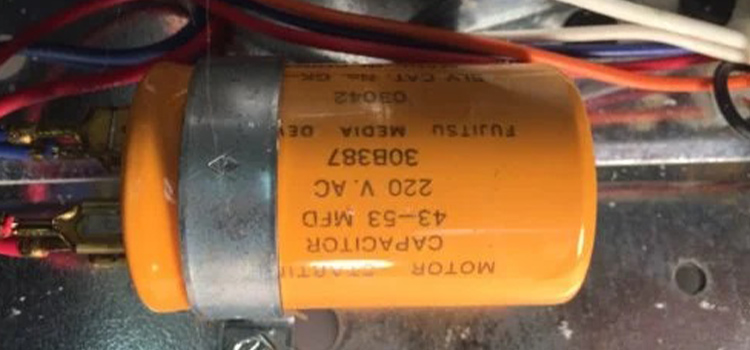Garage Door Opener Capacitor Keeps Blowing | Reasons & Solutions
A garage door capacitor refers to the start capacitor of a garage door motor. It is used to provide the initial starting power to the motor. The main causes of a garage door capacitor blowing are faulty connection, faulty supply outlet, corrosion of leads, overheating, jammed garage door, etc.
A garage door capacitor may fail for any of the above-mentioned causes. If the faulty capacitor is simply replaced without resolving the underlying cause of the capacitor blowing, then the new capacitor will not last long too. This is the cause of the garage door capacitor to keep blowing.

Reasons Why Garage Door Opener Capacitor Keeps Blowing
A starting capacitor is used in a garage door motor. Just like any induction motor a garage door motor requires a starting and running capacitor. The starting capacitor is more common to fail because the garage door motor experiences high torque during starting causing the starting capacitor to overheat.
The most common causes of a garage door capacitor blowing repeatedly are faulty connection/faulty supply outlet, corrosion of leads, overheating, jammed garage door, etc.
Faulty Connection/Supply Outlet
If the connection to the garage door opener or the outlet itself providing power to the door opener is faulty. The system will not get the required power to operate normally, which will put excessive stress on the capacitor, causing it to keep blowing.
Overheating
If the garage door is opened and closed continuously without giving the capacitor enough time to cool, the lifetime of the capacitor is severely reduced and will fail prematurely. So, enough time should be given to the capacitor to cool before using it again or a blower fan or heatsink could be used to cool the capacitor fast.
Jammed Garage Door
If the garage door is jammed, the motor will draw more power than the capacitor is rated for, to create the torque required to open the door. The start capacitor will keep blowing if the door mechanism is jammed. So, the door mechanism should be cleaned and lubricated regularly to extend the lifetime of the capacitor.
How Do I Know if My Garage Door Opener Capacitor Is Bad?
The first sign of a faulty capacitor is the garage door not operating, or making a hissing or buzzing noise. Upon visual inspection, if the capacitor is found to be bulging or any oily substance leaking from it, then the capacitor is surely faulty. A capacitor tester or multimeter may also be used to identify a faulty capacitor.
What Is the Function of a Capacitor in a Garage Door Opener?
The capacitor on a garage door is known as a start capacitor. Generally, a garage door opener operates off a 120V AC outlet. When the garage door motor starts, it draws more power than the supply can provide. So, a large electrolytic capacitor is used to provide the starting current to the garage door motor.
How Do I Test a Garage Door Capacitor?
A garage door capacitor can be tested just like any normal capacitor using a capacitance tester or multimeter. If the capacitor doesn’t show any capacitance on the capacitor tester or shows zero-ohm resistance between its terminals on a multimeter then the capacitor is surely faulty.
Can a higher-rated capacitor be used?
Yes, a higher voltage rated capacitor can be used instead of a lower voltage one as the start capacitor of a motor. But the capacitance of the two capacitors must be identical. If replacing the faulty capacitor with the identical one doesn’t solve the problem, using a higher-rated capacitor could potentially solve the problem.
Conclusion
A garage door capacitor may keep blowing due to faulty connection, overheating, jammed garage door, or a combination of other factors. The underlying causes of the capacitor blowing should be solved before replacing the capacitor to ensure the longevity of the replaced capacitor.
Subscribe to our newsletter
& plug into
the world of circuits